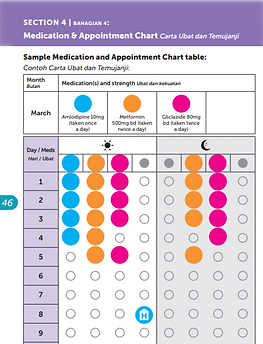
care tool project
We are collaborating with Médecins Sans Frontières to undertake a study that will evaluate the impact of a CARE tool on the health literacy, treatment adherence, empowerment and quality of life of refugee and asylum seeking patients with chronic and rehabilitative illness in Malaysia.
What is the CARE Tool?
The CARE Tool is handheld paper record/workbook developed by Diode that combines the traditional Health Passport with elements of a Person Centered Care Approach. The Tool helps patients have ownership of their medical information, encourages goal setting to monitor treatment progress with an interactive component for the patient and healthcare worker to work through the handbook during visits. The tool will be mostly visual, and where there is text, it will be in English.
Why the CARE Tool?
We have found that NCD and rehabilitative programs and health clinics often face a few major challenges including: (1) patients not understanding the importance of adherence to medication and treatment (2) patients not understanding how to take their medication (3) general poor health literacy (4) being lost to follow up and (5) patients generally not being in charge of their own information (referral letters, reports) and therefore don’t seem to know what happens during referrals or follow up.
Personal healthcare tools, where the patient holds information regarding their illness and care plan (Kaelber et al., 2008), have helped address some of these problems. Only a small number of health passports however are accompanied with a Care Plan and goal setting function that will empower and give patients choice in their clinical care. A further smaller number involves a health care worker and the patient interacting to develop the goals and care plan (Godier-McBard & Fossey, 2018). The CARE Tool therefore aims to be a mechanism that will not only help with better coordination of care at an operational level but also encourage self management and empower patients to take better care of themselves, which is in line with the Person Centered Care approach.
What is the aim of this study and what will happen?
The aim of the study is to test the effectiveness of the CARE tool, through implementation of the tool in primary care practice in the fixed and mobile clinics that see refugee and asylum seeking patients. Prior to implementation, the clinic staff will be trained on the tool, how it needs to be used and who are ideal candidates for its use. Patients that agree to participate will go through the exercise of filling in the tool and using the tool over a period of 9 months. We will continue to assess progress and impact through progressive quantitative and qualitative assessments throughout the 9 month period. Through this study we also hope to assess the feasibility, acceptance and perceived effectiveness of the CARE tool among healthcare workers and the patient population.
What happens if it is effective?
If the CARE Tool is found to be effective, it can continue to be incorporated other fixed and mobile clinics with a similar patient population. The CARE Tool can also easily be adapted for use in other geographical and population contexts.
Sample pages from the CARE Tool book
Current Project Status
We have completed a small pilot test of the Tool and have begun full implementation of the study since June 2021. To date, we have recruited about 58 participants and completed a baseline, 6 month and 9 month quantitative and qualitative measures with the participants. Do follow us on Social Media for more updates! Data collection is expected to end in February 2023.
The study has received ethical approval from the MSF ERB Ethics Review Research on 16 February 2021 and local ethics approval from the University Malaya Research Ethics Consultative Service on 17 November 2020.



